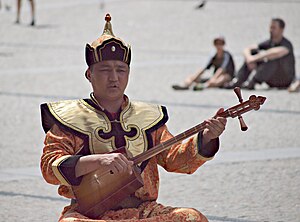Tuvinians
|
Tuvan throat singer.
|
|
| Total population | |
|---|---|
| c. 300,000 | |
| Regions with significant populations | |
|
|
|
|
|
c. 25,000 |
|
|
5,169 |
|
|
c. 3,900 |
|
|
43 |
| Languages | |
| Tuvan, Russian, Mongolian, Chinese | |
| Religion | |
| Tibetan Buddhism ("Lamaism"), Tengrism | |
| Related ethnic groups | |
| especially Tofalar, Soyots as well as other Turkic and Mongol peoples. | |
The Tuvans or Tuvinians (Tuvan: Тывалар, Тьvаlar/Tıvalar; Mongolian: Тува, Tuwa) are a Turkic people ethnic group living in southern Siberia. They are historically known as one of the Uriankhai, from the Mongolian designation.
Tuvans have historically been cattle-herding nomads, tending to their herds of goats, sheep, camels, reindeer, cattle and yaks for the past thousands of years. They have traditionally lived in yurts covered by felt or chums covered with birch bark or hide that they relocate seasonally as they move to newer pastures. Traditionally, the Tuvans were divided into nine regions called khoshuun, namely the Tozhu, Salchak, Oyunnar, Khemchik, Khaasuut, Shalyk, Nibazy, Daavan and Choodu, and Beezi. The first four were ruled by Uriankhai Mongol princes, while the rest were administered by Borjigin Mongol princes.
Besides prehistoric rock-carvings to be found especially along the Yenisei banks, the first internationally important archaeological findings have been near Arzhan, in the north central Tuva. Here, Scythian kurgan burials are being researched, revealing the earliest (7th, 6th century BC) and easternmost remains of these people who spread all the way to Europe. Their story and fantastic gold treasures can be appreciated in the National Museum in Kyzyl.
The Xiongnu ruled over the area of Tuva prior to 200 AD. At this time, a people known to the Chinese as Dingling inhabited the region. The Chinese recorded the existence of a tribe of Dingling origin named Dubo in the eastern Sayans. This name is recognized as being associated with the Tuvan people and is the earliest written record of them. The Xianbei defeated the Xiongnu and they, in turn, were defeated by the Rouran. From around the end of the 6th century, the Göktürks held dominion over Tuva up until the 8th century when the Uyghurs took over.
...
Wikipedia

